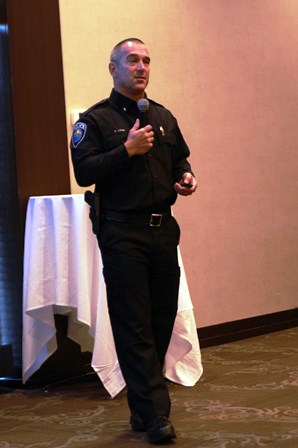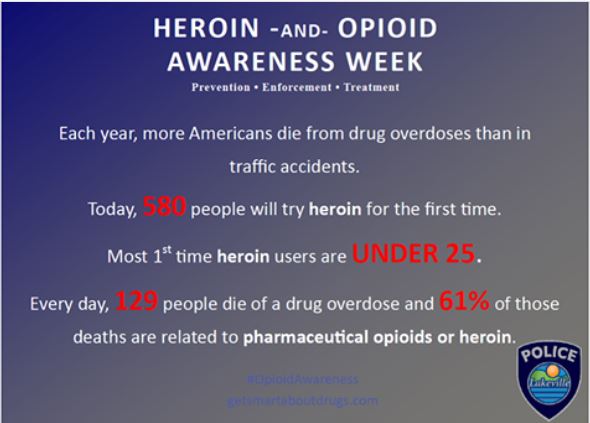Speaker-Chief Jeff Long
Posted on Oct 13, 2016

Police Chief Jeff Long
Heroin & Opioids & Mental Health – Update by Police Chief Jeff Long
Fentanyl is a synthetic opioid that is 80-100 times stronger than morphine. Pharmaceutical fentanyl was developed for pain management treatment of cancer patients, applied in a patch on the skin. Because of its powerful opioid properties, Fentanyl is also diverted for abuse. Fentanyl is added to heroin to increase its potency, or be disguised as highly potent heroin. Many users believe that they are purchasing heroin and actually don’t know that they are purchasing fentanyl.
An opiate (narcotic) drug processed from morphine and extracted from certain poppy plants. Heroin comes in a white or brownish powder, or a  black sticky substance known as “black tar heroin.” Often “cut” with other drugs or substances such as sugar or powdered milk. User is unaware how much actual heroin is being used, creating likelihood of overdose
black sticky substance known as “black tar heroin.” Often “cut” with other drugs or substances such as sugar or powdered milk. User is unaware how much actual heroin is being used, creating likelihood of overdose
 black sticky substance known as “black tar heroin.” Often “cut” with other drugs or substances such as sugar or powdered milk. User is unaware how much actual heroin is being used, creating likelihood of overdose
black sticky substance known as “black tar heroin.” Often “cut” with other drugs or substances such as sugar or powdered milk. User is unaware how much actual heroin is being used, creating likelihood of overdoseChief Long shared that more people are overdosing on these drugs than ever before. The most common use is with 18-25 year old middle class young males. More than 9 in 10 people who used heroin also used at least one other drug.
Chief Long also shared Interesting Facts from the 2015 United Nations Report on the connection between drugs and terrorism, starting with Afghanistan. Afghanistan, as you know, is a major source of heroin in the world, producing some 80 percent of the world's supply of opium, which is converted to heroin.
What can we do?
The solutions to this issue include:
- Educating the community.
- Encourage community members to use the Drug Boxes available at many Dakota County Police Departments.
- Take away the shame associated with drug addiction.
-
Recognition that heroin is not the dirty drug that it was in the past.
Mental Health
In Lakeville and many other cities mental health calls are increasing. Lakeville Police Department has recognized this issue and the city have put together team that follows up on the cases to see if anyone needs further help.
The follow-up to help the victim can include chaplains that help direct people to services like counseling or the county’s mental health crisis unit. Other resources include family, friends, churches, and work place programs.